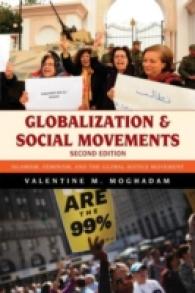- ホーム
- > 洋書
- > 英文書
- > Politics / International Relations
Full Description
This interdisciplinary book explores how the policy goal of gender equality operates in arguably the most masculinist area of politics: peace and security. Gender equality was set on the international peace and security agenda with the adoption of UN Security Council Resolution 1325 in 2000 and the inception of the Women, Peace, and Security (WPS) agenda. Celebrated internationally as an outcome of feminist advocacy efforts, the WPS agenda has over time become a site of contestation. Security institutions have questioned the placement of the gender equality objective within the peace and security sector, whereas feminist advocates have expressed their concerns about the capacity of security institutions to support gender equality in meaningful ways.
Drawing on insights of nearly seventy UN, government, international and local civil society experts, the book offers a systematic take on key gender equality debates within the WPS agenda in the case studies of UN Security Council, ASEAN and Pacific Islands Forum, and Governments of the Philippines and Australia. By looking back at the dilemmas of gender equality policymaking and their paradoxical effects in conflict and post-conflict situations, the book also looks forward to the third decade of the WPS agenda and the long-term impact of the agenda on the political struggle for gender equality in peace and security.
Contents
Foreword
Preface
Acknowledgements
Introduction: The Goal of Gender Equality in Peace and Security
Dilemmas of Gender Equality Policymaking
The Trajectory of Gender Equality
Paradigms of Gender Equality in The Women, Peace and Security Agenda
Global, Regional and National Perspectives
Empirically-Driven Research
Chapter 1: The United Nations Security Council
Gender Equality in the UN's Peace and Security Discourse
UNSCR 1325 and the Vision of Gender Equality
The Emergence of Paradigms of Gender Equality
The Security Paradigm
The Development Paradigm
The Human Rights Paradigm
Post-2015 Resistance to Gender Equality
Conclusions
Chapter 2: The Association of Southeast Asian Nations and the Pacific Islands Forum
The Role of Regional Organisations in Implementing UNSCR 1325
The Engagement of Asia and the Pacific with the Women, Peace and Security Agenda
Association of Southeast Asian Nations
Pacific Islands Forum
Conclusions
Chapter 3: Government of the Philippines
The Women, Peace and Sec







